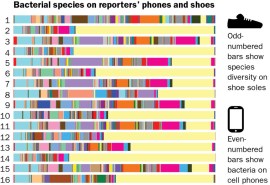Life
Sign up for our newsletter
We summarize the week's scientific breakthroughs every Thursday.
-
 Life
LifeStem cell treatment spurs cartilage growth
A small molecule called kartogenin prompts the manufacture of lost connective tissue in mice.
By Nathan Seppa -
 Paleontology
PaleontologyT. rex has another fine, feathered cousin
A trio of fossils from China may tip the scales on dinosaurs’ public image.
-
 Life
LifeFruit fly biorhythms differ indoors and out
Response to daily cues of real life suggest lab findings may need a second look.
By Susan Milius -
 Life
LifeGenes are no crystal ball for disease risk
For most conditions, knowing a person’s entire genetic makeup won’t help predict his or her medical history.
-
 Life
LifeVirus proves protective against lupus in mice
A mouse version of Epstein-Barr seems to prevent, not trigger, symptoms of the autoimmune disease.
-
 Life
LifeOld cancer drugs offer new tricks
Drugs that reboot genetic programming make tumor cells more susceptible to cancer-killing therapy.
-
 Chemistry
ChemistryFor truffle aroma, it’s not all about location
Genes, not environment, play a key role in the prized fungus’s scent.
-
 Life
LifePesticide-dosed bees lose future royalty, way home
Unusual field tests reveal how common insecticides, even at nonfatal doses, can erode colonies and threaten the future of bumblebees and honeybees.
By Susan Milius -
 Life
LifeFossils show signs of earliest burrowing
Worms’ seafloor tunneling more than a half-billion years ago could have stirred up evolutionary forces.
By Devin Powell -
 Life
LifeThe farther the better for corals after oil spill
Deepwater organisms may be slow to recover from Gulf accident.
-

-
